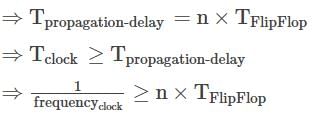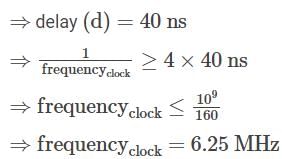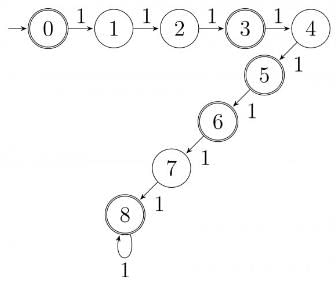GATE Mock Test Computer Science Engineering (CSE) - 5 - Computer Science Engineering (CSE) MCQ
30 Questions MCQ Test - GATE Mock Test Computer Science Engineering (CSE) - 5
If (a + b) : (b + c) : (c + a) = 7 : 6 : 5 and a + b + c = 27, then what will be the value of 

Direction: The following sentence consists an bold word(s) followed by four options. Select the option that is nearest in meaning to the bold word and mark your response accordingly.
The inherent danger in the problem is that it would lead to many more problems.
Direction: Study the following graph carefully and answer the question based on the information given below.
Percentage distribution of teachers who teach six different subjects
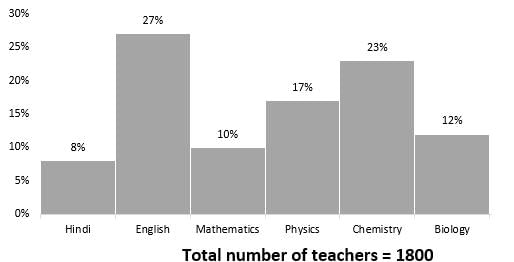
If the percentage of Mathematics teachers is increased by 50% and percentage of Hindi teachers is decreased by 25%, what will be the total number of Mathematics and Hindi teachers together?

If the percentage of Mathematics teachers is increased by 50% and percentage of Hindi teachers is decreased by 25%, what will be the total number of Mathematics and Hindi teachers together?
In how many ways can an interview panel of 3 members be formed from 2 engineers, 3 psychologists and 4 managers if at least 1 psychologist must be included?
Direction: In the following question find out the alternative which will replace the question mark.
Ornithologist : Bird :: Archaeologist : ?
If the LCM of the first 100 natural numbers is N, then the LCM of the first 105 natural number will be:
Which of the following is an antonym of the word PROFESSIONAL?
The ratio of cost price and marked price of a cell phone is 2 : 3 and ratio of profit percentage and discount percentage is 3 : 2. What is the discount percentage?
Directions: Choose the sentence that best combines the given sentences.
The airport is called the Glynco Jetport. The airline reservations and travel systems refer to the location as Brunswick, Georgia.
Leo participated in a race of motor bikes. Flags of different colours are lowered to give different signals. How many different signals can be made here, using any number of flags from 5 flags of different colours?
In a trunk there are 3 types of ice cream of flavors vanilla, chocolate and blueberry. The probability of selecting one vanilla ice-cream is 1/2 and probability of selecting one blueberry ice-cream is 2/7. The total number of chocolate ice-cream is 6. Find the number of ice creams in the trunk:
Disk requests come to a disk driver for cylinders in the order 176, 79, 34, 60, 92, 11, 41 and 114. The initial head is positioned at 50 and the direction is moving from left to right. What is the total head movement (in the number of cylinders) incurred while servicing these requests, if LOOK scheduling is used?
Let R1(a,b,c) and R2(x,y,z) be two relations in which a is the foreign key of R1 that refers to the primary key of R2.
Consider the following four options:
Which of the following is/are correct about the referential integrity constraint?
Consider a long-lived TCP session with an end-to-end bandwidth of 1 Gbps (=109 bits-per-second). The session starts with a sequence number of 1234. The minimum time (in seconds, rounded to the closest integer) before this sequence number can be used again is _________.
Which of the following option is true?
For the matrix  , one of the normalized eigen vectors is given as:
, one of the normalized eigen vectors is given as:
Which of the following statements are true about round-robin scheduling?
Consider a counting semaphore S. The operation P(S) performs the operation S = S − 1 and operation V(S) performs the operation V = V + 1. During program execution, 13 P and 5 V operation is performed in the some order. Find the number of processes in a blocked state with initial counting semaphore value 1.
Consider the following policies for preventing deadlock in a system with mutually exclusive resources.
Which of the below policies can be used for preventing deadlock?
Consider the following relational schema for students (STU):
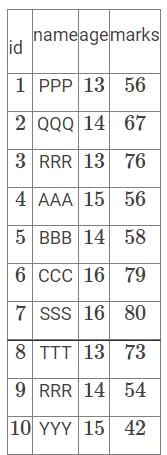
The following query is made on the database.
T1 → Πid, name (σage >13∧age<16(STU))
T2 → Πid, name (σmarks >55∧ marks <66(STU))
T → T2 − T1
The total no. of rows in T is ________.
What is the minimum and maximum number of link field updations required respectively to insert a new node in the double linked list?
Consider a two dimensional array A[1…10][3….8] that is column index ranges from 3 to 8 and row index ranges from 1 to 10. Now suppose element are arranged in column major order. If base address of A is 1000 then address of element A[5][7] will be _________ (Assume size of each element is 1).
For the digital circuit shown in below figure, the output F is found to be '1' when P is logic '0'.
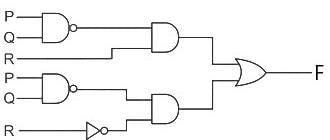
Choose the correct answer from the below given options for the function F:
Consider X = 11111011 and Y = 00001010 be two 8 bit two's complement number. What is the value of their product in two's complement?
Which of the following is/are true about conflict miss?
Consider the following problems L(G) denotes the language generated by a grammar G.L(M) denotes the language accepted by a machine M.
(I) For an unrestricted grammar G and a string w, where w = L(G).
(II) Given a Turing Machine M, whether L(M) is regular.
(III) Given two grammars G1 and G2 whether L(G1) = L(G2).
(IV) Given an NFA N, whether there is a deterministic PDA P such that N and P accept the same language.
Which one of the following statements is correct?
Suppose that a robot is placed on the cartesian plane. At each step it is allowed to move either one unit up or one unit right, i.e., if it is at (i,j) then it can move to either (i + 1,j) or (i,j + 1).
How many distinct paths are there for the robot to reach the point (10,10) starting from the initial position (0,0)?
Each flip-flop in a 4-bit ripple counter introduces a maximum delay of 40 n sec. The maximum clock frequency is:
Consider the regular language L = (111 + 11111)∗. The minimum number of states in any DFA accepting this languages is:
A network using CSMA/CD has a bandwidth 10 Mbps. If the maximum propagation time (including delays in the devices and ignoring the time needed to send a jamming signal) is 25.6 microseconds. What is the minimum size of the frame?











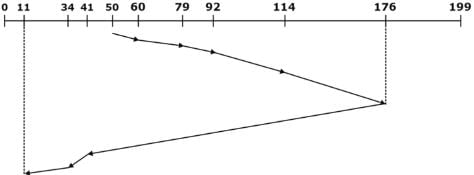






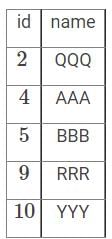
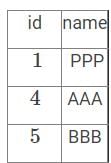

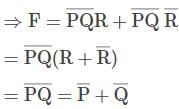
 (always whether Q is '0' or '1')
(always whether Q is '0' or '1') ways
ways